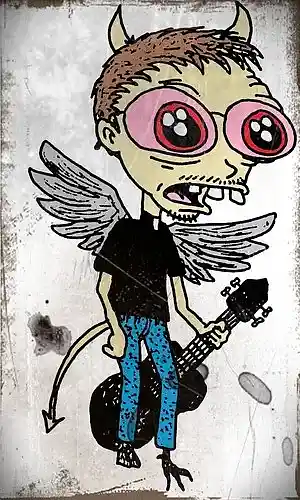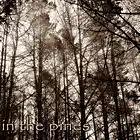also known as "Black Girl" and "Where Did You Sleep Last Night", is a traditional American folk song which dates back to at least the 1870s, and is believed to be Southern Appalachian in origin. The identity of the song's author is unknown...

Weird & Feared Since 1987
Just when you thought is was safe to wipe...
I've been making alot of weird and tasteless music for over ten years and I think that this music is probably some of the best I've done to date. Lately, I've been blessed with alot of inspiration for my loving wife, Jamie along with some soul searching with my spirituality. I've never put so much of myself into a record before, I usually try to stay as far away from genuism or messages in my music. I suppose it comes with age as well. My lyrics may still be slightly crude and vulgar but I want everyone to know that this time, I felt something when I said them.
fuck you very much,
Reverend Ryan
Story behind the song
Like numerous other folk songs, "In the Pines" was passed on from one generation and locale to the next by word of mouth. The first printed version of the song, compiled by Cecil Sharp, appeared in 1917, and comprised just four lines and a melody. The lines are:
"Black girl, black girl, don't lie to me
Where did you stay last night?
I stayed in the pines where the sun never shines
And shivered when the cold wind blows"
In 1925, a version of the song was recorded onto phonograph cylinder by a folk collector. This was the first documentation of "The Longest Train" variant of the song, which includes a stanza about "The longest train I ever saw". This stanza probably began as a separate song that later merged into "In the Pines". Lyrics in some versions about "Joe Brown's coal mine" and "the Georgia line" may refer to Joseph E. Brown, a former Governor of Georgia, who famously leased convicts to operate coal mines in the 1870s. While early renditions which mention the head in the "driver's wheel" make clear that the decapitation was caused by the train, some later versions would omit the reference to the train and reattribute the cause. As music historian Norm Cohen pointed out in his 1981 book, Long Steel Rail: The Railroad in American Folksong, the song came to consist of three frequent elements: a chorus about "in the pines", a stanza about "the longest train" and a stanza about a decapitation, but not all elements are present in all versions.[1][2]
Starting in 1926, commercial recordings of the song were done by various folk and bluegrass bands. In a 1970 dissertation, Judith McCulloh found 160 permutations of the song.[3] As well as rearrangement of the three frequent elements, the person who goes into the pines, or who is decapitated, is described as a man, woman, adolescent, husband, wife, or parent, while the pines can be seen as representing sexuality, death, or loneliness. The train is described as killing a loved one, as taking one's beloved away, or as leaving an itinerant worker far from home.[1]
In variants in which the song describes a confrontation, the person being challenged is always a woman. The folk version by the Kossoy Sisters asks, "Little girl, little girl, where'd you stay last night? Not even your mother knows." The reply to the question, "Where did you get that dress/ And those shoes that are so fine?" from one version is, "From a man in the mines/Who sleeps in the pines."[1] The theme of a woman being caught doing something she should not is thus also common to many variants. One variant, performed in the early twentieth century by the Ellison clan (Ora Ellison, deceased) in Lookout Mountain, Georgia, tells of a young Georgia girl who flees to the pines after being raped. Her rapist, a male soldier, is later beheaded by the train.
Some versions of the song also reference the Great Depression, with the "black girl" being a hobo on the move from the police, who witnesses the murder of her father while train-jumping. She hides from this by sleeping in the pines, in the cold.
Lyrics
Black girl, black girl don't lie to me
Tell me where did you sleep last night?
In the pines, in the pines where the sun don't ever shine
And I shivered the whole night through
Black girl, black girl where will you go?
I'm going where the cold wind blows
In the pines, in the pines where the sun don't ever shine
and I'll shiver the whole the night through
My husband was a railroad man
Killed a mile and half from here
His head was found in a driving wheel
But his body will never be found
Black girl, black girl don't lie to me
Tell me where did you sleep last night?
In the pines, in the pines where the sun don't ever shine
And I shivered the whole night through
Black girl, black girl where will you go?
I'm going where the cold wind blows
In the pines, in the pines where the sun don't ever shine
and I'll shiver the whole the night through
Black girl, black girl don't lie to me
Tell me where did you sleep last night?
In the pines, in the pines where the sun don't ever shine
And I shivered the whole night through

